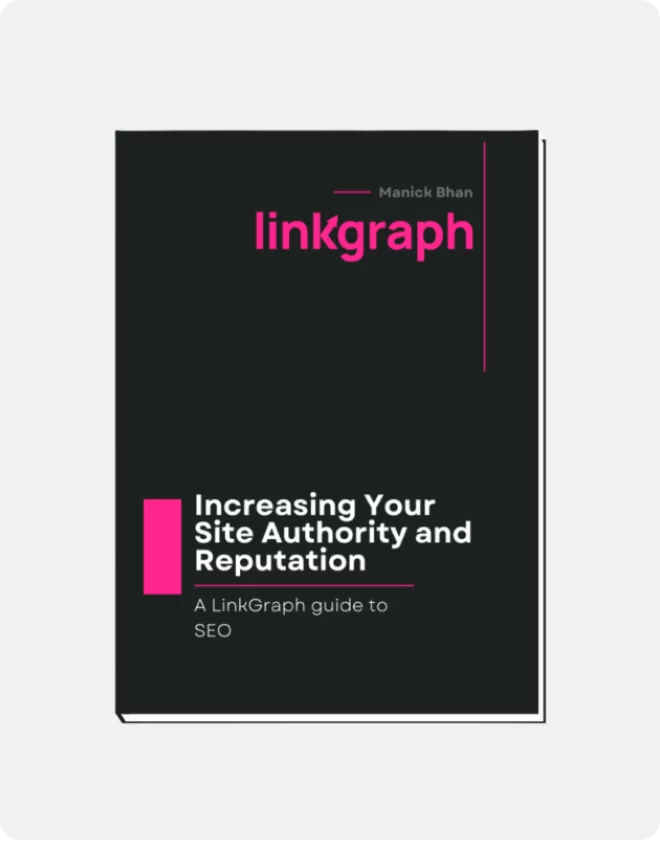14 SEO Tips for Accountants and Financial Advisors
Accountants and financial advisors need better ways to develop leads. With increased competition in highly saturated markets, it’s often difficult to stand out. But the right accountant […]
Accountants and financial advisors need better ways to develop leads. With increased competition in highly saturated markets, it’s often difficult to stand out. But the right accountant or financial advisor SEO strategy can be the difference that helps your financial or accounting firm earn the quality clicks that generate increased leads and revenue.
As a business owner, you need to consider what tactics you’re using to protect your business’s health. Since so many potential clients depend on the internet to find an accounting firm or CPA, brands need a mastery of local SEO and other digital marketing concepts to ensure continued growth and development.
Why is SEO for accountants and financial advisors so important?

Search engine optimization (SEO) is the cornerstone of many digital marketing strategies. Whether you’re a member of an accounting firm, a broker, or an investment advisor, SEO is necessary if you want your business to flourish. Even if you’re not on Wall Street, SEO can help you find a high-prospect client, direct traffic to your firm’s website or homepage, and increase the value of your blog posts. After all, you want to show up on search engines when clients are looking for financial advice and services.
On top of that, many customers depend on the top results of a search engine result page (SERP) to find a new business. Some customers turn to social media profiles, as well. Many searchers only click on the first three page titles shown to them in the SERPs. If you want your accounting practice to snag one of those spots, you need to master your SEO strategy.
If you’re ready to improve your rank in the accounting industry or you’re looking for the best way to help your CPA firm stand out, here are 14 SEO tips that benefit small business entrepreneurs and larger bookkeeping organizations alike.
1. Research financial or accounting services keywords
SEO is all about the keywords. Whether you want to appear in local search or source organic traffic from around the world, you need a way to appear in relevant search results.
Keyword research is one of many best practices for any national or local SEO campaign. It involves finding the right keywords that connect financial professionals or accountants to their target audience. A keyword, in and of itself, relates to what people are typing into their search engines. Keywords can be single words or entire phrases that tell search engines the purpose of a page. Here are some examples of keywords that people use when searching for financial and accounting services.
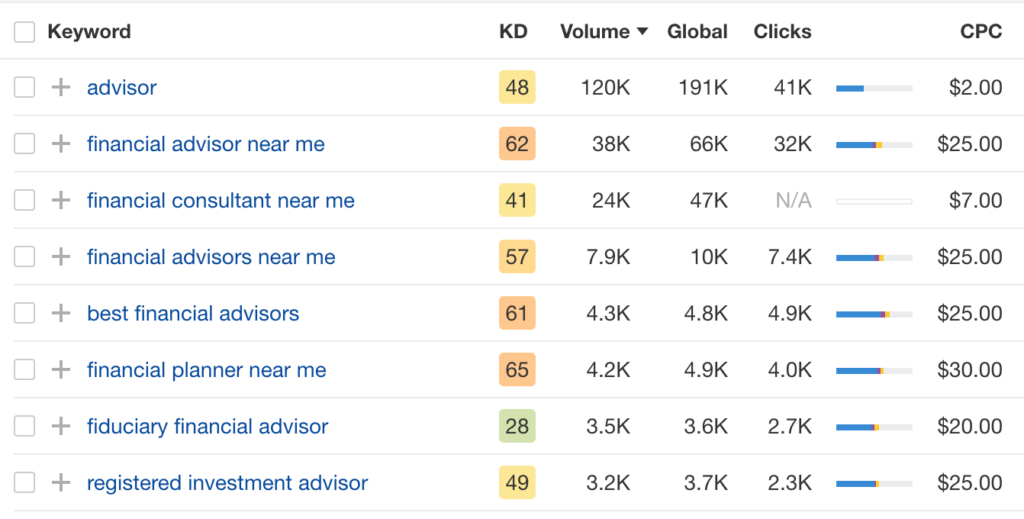
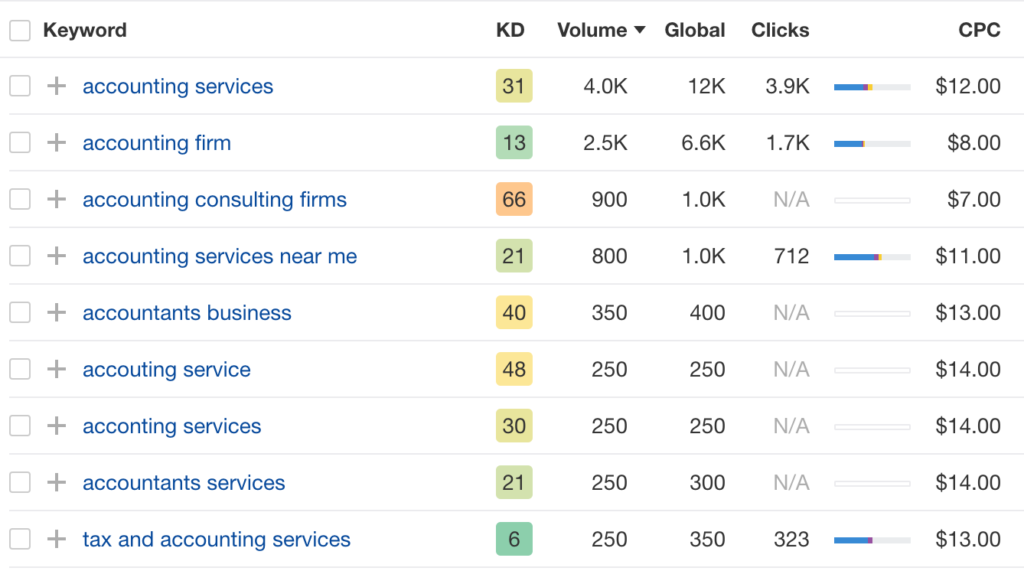
You can find crucial information about keywords using a keyword tool. Many keyword tools like Google Analytics help you narrow down the right keywords for your target market or local area. Google also offers planning tools that many professional services and SEO companies rely on to build robust campaigns for financial institutions.
With the right keywords, it’s easier to hit your top marketing goals for your business niche. Search volume, cost-per-click, and keyword difficulty are the metrics that will help you determine the best keywords to select. Brush up on your SEO keyword knowledge before choosing the keywords you want to optimize your financial website for.
2. Create high-quality accounting and financial advisor content
Many small business owners overlook content marketing because it requires a fair amount of effort and upkeep. However, your website’s content is critical if you’re running an SEO campaign to boost your online presence.
While engine optimization depends on choosing quality keywords and keyword phrases, you also need to consider how you use those words or phrases. This means creating relevant, informative, and valuable content that speaks to those keywords.
For example, Goldman Sachs creates videos from experts discussing current market trends and news. Using rich media is great for engaging users and showing off your brand authority and expertise.

Having a blog or resource center is both helpful for ranking for more keywords and for showing off your authority and trustworthiness in your financial or accounting space. This accounting firm offers a resource center with helpful articles on fiduciary accounting.
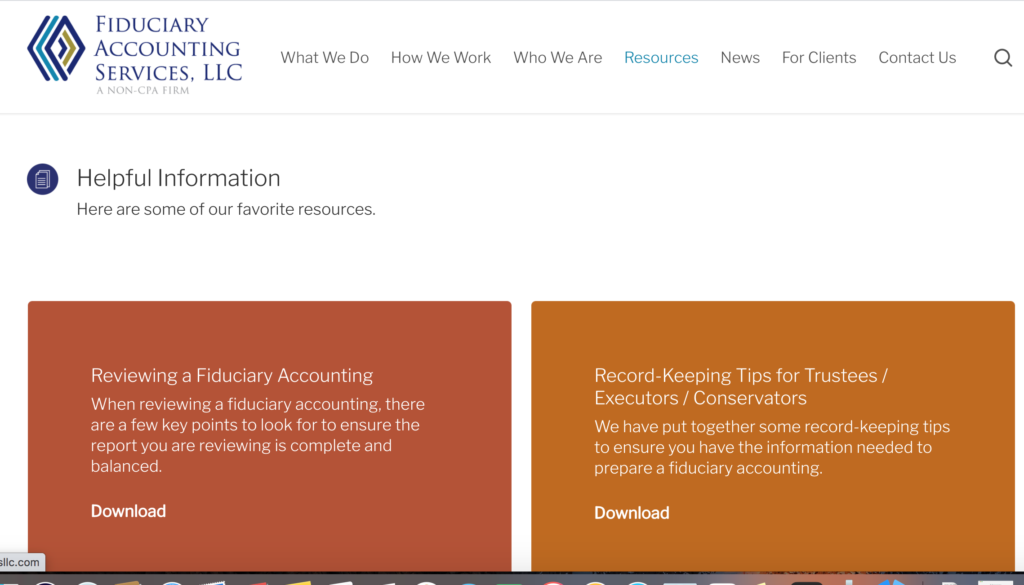
The topics you choose to create quality content about will depend on the size of your accounting business, the services you offer, or the markets you serve. These posts should include relevant keywords and phrases to help search engines understand the page content and to build your authority and expertise in your niche. They should also meet Google’s quality guidelines by being informative, original, useful, and having a lot of topical depth.
Another bonus is that a quality post is also ripe for sharing across social media platforms and in earning backlinks from other URLs. The great thing about great content is that other people want to share it (and link to it!)
3. Don’t forget about the user experience
If you want good online reviews on Yelp or think you can generate some referrals, you can’t neglect your user experience. This also impacts how well your website ranks on the different search engines. Many sites have issues with loading speed. While some of these cases can be attributed to browsers with slower computers or bad internet connection, often the problem lies with the website itself.
Not only search engines value page speed, either. Users tend to “bounce” from different sites if they’re too slow to load. So, while it’s possible that a potential accounting client clicked on your site, they may have left just as quickly.
The good news is that you can check your page speed whenever you want. Even Google has its own tool that will tell you how fast your site loads.
It’s a good idea for any local business or national organization to invest in a few page speed upgrades. Google and its counterparts tend to value pages that load quicker.
4. Prioritize the mobile experience
Google uses mobile-first indexing, which means that any time the search engine crawls your website, it’s specifically looking at the mobile version. You need to keep in mind that many of your potential clients might not view your website from a desktop computer. As a result, you must create a mobile-friendly user experience. You can optimize your site for mobile performance and even create a mobile application if you’re so inclined.
As long as you create a user experience that works across all devices, you’re on the right path. It’s important that your financial advisor website is responsive and adjusts it’s display depending on the device the searcher uses.
Here’s a desktop version of a private wealth management website:

And here is the same website displayed on a mobile device:

Of course, this is easy enough to say, less so to implement on your own. Not as tech-savvy? An SEO agency can help you make the right changes to your website so it’s ready for mobile-first optimization.
5. Make sure your financial advisor or accounting website is secure
A massive part of an accountant or financial advisor’s job is gaining and maintaining trust. After all, if a customer doesn’t trust your services, they’re not going to have you handle their money.
However, you’re not the only one who has to be trustworthy. Your site needs to be as well. Think of it this way: You wouldn’t put a client’s sensitive financial information on social media, would you? Then it would help if you also didn’t go without the proper security designation.
SSL, or Secure Sockets Layer, is a verification tool that shows that a website has proper security and can keep your data safe. Though you can’t tell if a site has a current SSL by its page title, you can go through the URL. A site with an active SSL has HTTPS in the URL. A site that doesn’t only has HTTP.
Many search engines prioritize added web security and aren’t as likely to offer high rankings to unsecured sites. It’s something you need to consider, even if it’s not the time for your domain renewal. Whether you’re on Wall Street or work with individual investors, enhanced security is practically a fiduciary rule.
6. Set up business profiles for your financial firm or accounting business
A big component of SEO is making your brand easier to find, whether on Google, Bing, or another search engine. That’s part of why it’s so important to have active business profiles for each of the major search platforms.
Google My Business gives your customers click-to-call capability and provides a snapshot of your online reviews, location, and your business hours.
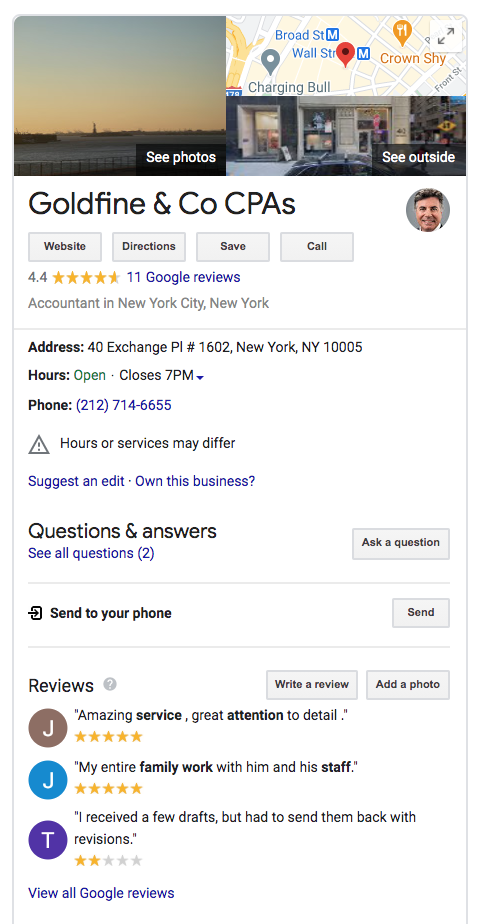
The same applies to similar platforms on other engines. Plus, some of these general citation pages offer valuable links back to your homepage. It’s a great way to catch the attention of a passing client.
If you’re unsure whether or not you have citations on various pages, you can run an audit to check. Based on the audit results, you can manually input your information on the different sites, or you can use a managed service or SEO agency to do so for you.
7. Invest in the right backlinking opportunities
Once you’ve developed a stellar piece of financial or accounting content, don’t you want it to perform well? Of course you do. That’s why you need to set aside resources to help generate links to that content or landing page.
Backlinking opportunities also show how many different websites view you as a trusted source. Google and Bing take that into account when they’re assessing ranking potential. Of course, you don’t want to pay for bulk links that are placed on spammy websites. While it may produce a quick SEO boost, it’s ultimately going to harm you over time.
Low authority and low-trust websites don’t have great reputations on different search results sites, so invest in white-hat platforms instead.
8. Remember your internal links
While every SEO expert is sure to tell you the value of backlinks, you need to consider your internal linking structure as well. Your website is, in fact, a web. For accountants and financial advisors, it’s your goal to keep a potential client on that web as long as possible.
This is because the more time a customer spends on a website, the more likely they are to convert. If you tend to neglect internal linking opportunities, write yourself a memorandum or craft an executive order.
You want to pick links to high-performing pages so you can direct customers to valuable content, optimized service pages, and other blog posts that showcase your brand’s value. However, you don’t want to rely on the same links over and over again. Switch things up now and again, so you’re spreading the link-building potential across your entire website.
9. Consider guest posting about your accounting or financial expertise

Guest posting is a great way to secure some valuable backlinks from trusted sites. It involves creating a piece of content for a site that accepts posts, pitching that content, and writing the article.
Of course, it’s not quite that simple. To start, you need to find sites that accept guest posts. Luckily, you can turn to the SERPs for that. Do searches for a relevant keyword followed by phrases like “write for us,” “guest posts,” or “contribution.” This will help you find applicable guest posting opportunities. Once you’ve found a few potential sites, you want to vet them for quality. Audit each site to determine its relative domain authority ranking, monthly traffic, and posting frequency. These factors should all be weighed before you pitch.
Here are just a few examples of websites that accept blog posts from financial experts:
- Modest Money
- BeatingBroke
- Cash Money Life
- Wise Bread
- Money Crashers
- Personal Finance Analyst
- Nine Hub
- Finance Gab
- The Financial Diet
- RightAboutMoney
And some publications that are looking for guest posts from accountants:
- Meru Accounting
- A-Counting Biz
- Bita Accounting
- FinanceTalk.net
- AccountingHelper
- Business Magazine
- InvoiceBerry
- FinancePost
- Merrchant
- AccountingWeb
Before you pitch a guest blog, look at the site’s recent posts. Go through the past few months of a guest posting site’s history and look for content and knowledge gaps. This will help you when you’re ready to start pitching. Once you’ve found a few gaps, you can do keyword research to help you generate topics.
For your pitch, you should think of three potential ideas to pitch to the site. You could write about E&O, investment advisors, fiduciary rule lawsuits, or anything else as long as it offers valuable insights to the target site.
Then you can start reaching out to different sites with your ideas. If someone accepts, you’ll write the article, go through the revision process, and secure your backlinks. Guest posting is a great way to get some quality traffic from other websites. It’s the ideal tool to have at hand.
10. Develop your local citations
While your Google My Business page is important, you need to invest in other local citations, especially if you’re trying to assert yourself in your local area’s market.
Many CPA firms with in-person locations depend on citations to boost their overall rankings. It’s a great way to secure an easy link, but it also shows Google that you’re easy to find and you provide a good amount of relevant information to your would-be clients.
For CPAs, financial advisors, or accountants, you’ll want to look for different financial services directories. These are the most relevant to your field, and you should think of them as another channel for client acquisition. Here is an example of an accounting directory where you could add a citation for your accounting business.
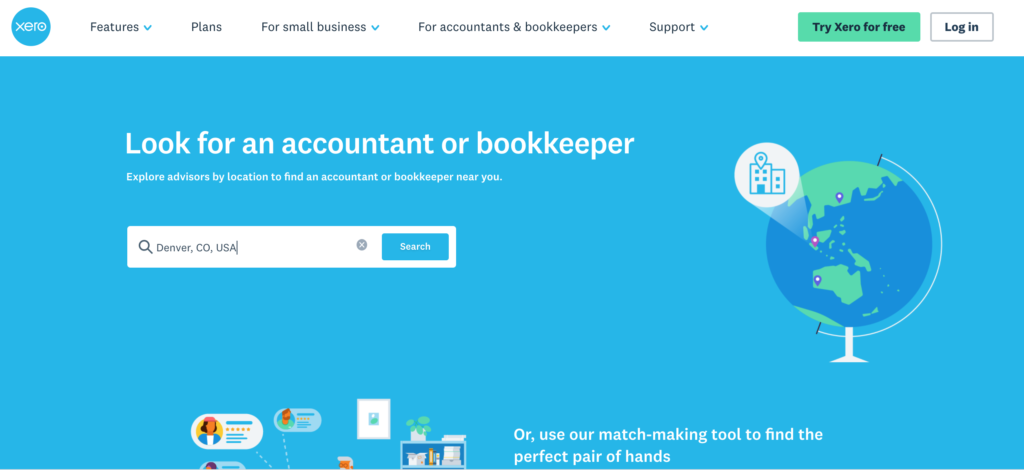
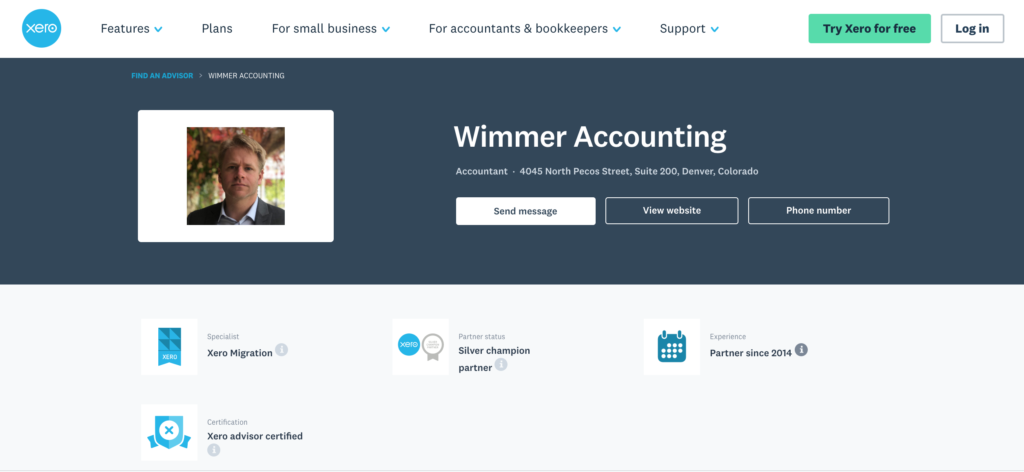
11. Get more reviews on the appropriate pages

Online reviews are one of the easiest ways to secure new clients. Most people rely heavily on word-of-mouth referrals because it often skips a good amount of the trust-building brands have to do to secure a purchase. A good referral is golden for your business. However, it’s often more difficult to get reviews than you’d think.
Luckily, there are a few tried tactics that make this easier. To start, you can ask some satisfied clients. Did you recently have a client that was satisfied by your omissions insurance recommendation? How about one who appreciated your explanation of the Dodd-Frank Act? If you have a handful of customers that you know are satisfied, draft up an email. Thank them for their business and see if they’re willing to post a review on your preferred platform.
You can also include simple review links on your website. These direct customers to exactly where they need to go, so there’s no confusion about the review process. Even some tools can help automate customer feedback collection, which makes for less time and resources spent securing reviews.
12. Optimize for local searches
For financial advisors and accountants who primarily serve a local geographic area, local SEO best practices are essential for showing up in the Google Map pack and local searches. If you’ve earned some local citations from tip #10, that will help your local signals grow, but it’s also important to include location information on your website.
It’s also a good idea to have multiple location-specific pages. If you run a CPA firm with multiple locations across the region, you want to optimize for each local area. It’s a better way to reach more relevant and qualified customers. Your local citations also need to make it clear that your business has multiple offices.
Getting in the coveted Google Map Pack can be extremely beneficial in improving calls and requests to your office. The Map Pack makes it easy for searchers to immediately reach out to your financial advisory or accounting firm.

Here are a few additional tips for increasing your accounting or financial services website’s chances of getting into the map pack:
- Optimize your Google My Business Listing
- Earn more local and business citations
- Have a responsive website
13. Optimize for stronger lead generation
In many ways, SEO is the ideal lead generation tool. Instead of spending excess time and money manipulating ads and pushing for conversions, SEO brings new clients to you.
However, if you’re not generating any leads, your SEO campaign probably isn’t doing much for your site. To start, you want to make sure that each page has a lead generation form and an appropriate call to action (CTA). This accounting website immediately prompts users to submit an email address in exchange for a useful content marketing item.

Other strategies for improving lead generation include implementing chat functionality. Many clients want to work with brands that are constantly available. The same goes for the accounting industry. Live chat functionality might not be as manageable for a small business, but you can invest in some programs and chatbots that make it easier to provide 24/7 service. Chat services have a good record of securing leads, so you don’t want to release a site iteration without one.
It’s also a good idea to run tests and make ongoing adjustments. Even if a landing page or a contact form starts performing well, that doesn’t mean that will always be the case. You need to regularly maintain your pages and lead generation forms to ensure they continue to draw potential clients. A/B testing helps you collect data for page performance metrics, so it’s a good idea to develop multiple versions of any service page or the contact page to determine what performs better.
Lastly, you should continue to measure your lead generation and invest in channels that succeed more frequently. In many cases, your homepage will drive a good number of your leads. However, certain blog posts, social links, and ads can generate leads as well. Review the data to see which channels need the extra attention.
14. Be patient
In almost all scenarios, SEO is a long-term investment. It requires a fair amount of experimentation, adjustment, and patience if you want a successful campaign. Whether you’re a startup CPA firm that’s looking to make waves or you’re an established brand that wants an added digital push, SEO can help over time. However, it often takes time and resources to do so, and instant results are a rarity. The right SEO strategy can enhance lead generation and conversion for years to come as long as you maintain it. As long as you continue to move the needle in the right direction, you know your SEO campaign works as intended.

Accountants and financial advisors rely on SEO just as much as other industries. While search engine optimization sounds complicated, the learning curve is worth it when you start to see results. For professionals who don’t want to handle engine optimization with an in-house team, the best way to increase your online presence is through an SEO firm’s assistance. The right agency can help you clarify your goals and implement effective changes. It also makes it more intuitive to track progress and results and make the necessary adjustments your brand needs to flourish.
If you’re ready to take over your market, reach your target audience, and find new potential clients, it’s time that you gave SEO a closer look.












































































